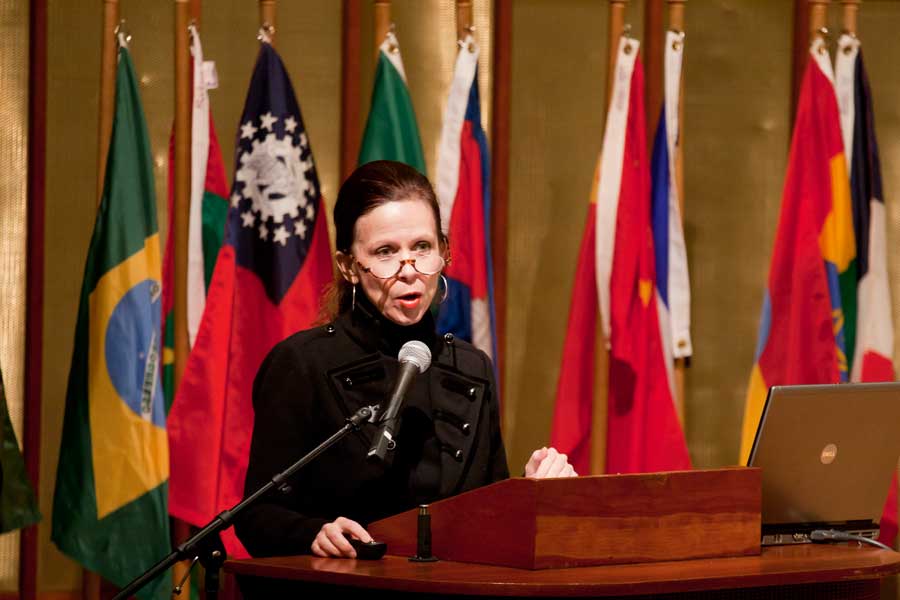

Venture Boldly

Adriana Colindres
Features Editor
2 East South Street
Galesburg, IL 61401


by Rana Tahir '13
Journalist and political analyst Robin Wright delivered the inaugural Stellyes Distinguished Lecture in Global Affairs at Knox College as part of the college's 175th anniversary celebration.
The February 28 lecture was based on her most recent book, Rock the Casbah: Rage and Rebellion across the Islamic World, which focuses on a cultural change in the Middle East through activism, art, music, and media.
With two-thirds of the populations of the Middle East under the age of 30, this baby boom generation is breaking away from the status quo of the region, according to Wright.
Using photos from her time in the Middle East, she gave a broad overview of what was happening in the Middle East at the time of the "Arab Spring" through the profiles of several individuals in the region.
"What is so striking to me today is the vastly diverse political environment," Wright said. "In the world's most volatile region, a majority of people launched their protest by peaceful civil disobedience."
Wright showed photos of various protests and of specific people throughout the Middle East. One of those people was Mohammed Bouazizi, a 26-year-old Tunisian street vendor.
When Bouazizi refused to pay a bribe to a Tunisian officer to stay in business, his fruit and scale were confiscated. Bouazizi sought help from several government offices, but no one would help him. In protest, he doused himself in paint thinner and set himself on fire.
His actions started the Jasmine Revolution, which deposed the president of Tunisia. "One man can make a difference," Wright said.
Wright then told the story of Khaled Said, an Egyptian blogger who was beaten to death by Egyptian police under then president Mubarak's rule. "This next slide is tough," Wright warned just before showing a photo of Said's brutally beaten body.
Said's death was the start of the "We Are All Khaled Said" campaign, a protest against the government of longtime Egyptian President Hosni Mubarak. Eighteen days later, Mubarak was forced from office.
She focused next on Dalia Ziada, an Egyptian human rights activist who is a vocal opponent of female genital mutilation, also known as circumcision. Contrary to popular myth, it is not a religious tenet but a cultural phenomenon in Africa.
After her own traumatic experience with circumcision, Ziada tried to convince her relatives not to do the same to her female cousins. After failing many times, Ziada eventually persuaded her uncle to spare her youngest cousin.
Wright told the Knox audience: "There needs to be a culture of change before change happens."
That change is becoming evident in music and other forms of media, she said.
She showed pictures of Arab rap musicians such as El General, whose political music was sung after the Tunisian president was deposed; DAM, an Palestinian rap group working with their Israeli counterparts to promote peace; and Kiosk, an Iranian rapper whose CD was distributed by opposition leaders in the 2009 Iranian presidential election.
Wright Meets Students
During her visit to Knox College, Robin Wright met with Knox students for an informal question-and-answer session in George Davis Hall.
Senior Maksymilian Czuperski asked Wright about the likelihood of a war between the United States and Iran.
“I’m not a betting woman," she said. "My dad would bet on politics, but he’d only bet 25 cents. I would bet 50 cents on no war with Iran, with the caviat” that a small event doesn’t erupt into something larger.
Senior Julius Parod wanted to hear Wright’s view on whether the Green Movement, the opposition movement in Iran, would be able to revive itself.
Wright, who was in Iran at the time of the contested 2009 Iranian election, said she wasn’t sure.
Wright then told the story of Kuwaiti psychologist Dr. Naif Al-Mutawa who created "The 99" comic book superheroes based on the 99 characteristics of God in Islam. Half of the superheroes are women, and half of the women wear the hijab (an Islamic headcovering) while the other half do not. His goal is to create new role models, and characters include Muslim heroes and heroines from all over the world, Wright said.
Wright has covered the Middle East since 1973, including all six wars in the region since then, and has interviewed many of the heads of state who have been deposed in the last year.
Wright's Rock the Casbah was selected as the first read for the KnoxReads book club and blog. The blog had Knox professors of political science, history, and economics comment on the book and the current happenings in the Middle East.
She has written several other books, including Dreams and Shadows: The Future of the Middle East, Sacred Rage: The Wrath of Militant Islam, and The Last Great Revolution: Turmoil and Transformation in Iran. A frequent broadcast news commentator, Wright has appeared on NPR Weekend Edition, ABC-TV's This Week, CNN's State of the Union, and BBC World News America.
The Inaugural Stellyes Distinguished Lecture in Global Affairs was established along with the Eleanor Stellyes Center for Global Studies by a gift from Eleanor Stellyes, who attended Knox College from 1932 to 1934.
"We have a tradition of great speakers," Knox College President Teresa Amott said when introducing Wright. "Eleanor Stellyes believed that knowledge of cultures is key to American success. Robin Wright embodies that commitment to and passion for insight and understanding."
Published on March 02, 2012